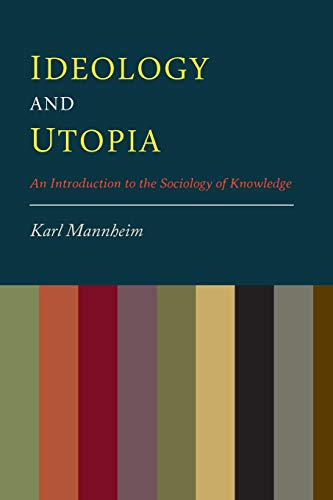Verwandte Artikel zu Ideology And Utopia: An Introduction to the Sociology...

Inhaltsangabe
2015 Reprint of Original 1936 American Edition. Exact facsimile of the original edition, not reproduced with Optical Recognition Software. Karl Mannheim was a Hungarian-born sociologist, influential in the first half of the 20th century and one of the founding fathers of classical sociology as well as a founder of the sociology of knowledge. His essays on the sociology of knowledge have become classics in the field. In "Ideology and Utopia" he argued that the application of the term ideology ought to be broadened. He traced the history of the term from what he called a "particular" view. This view originally saw ideology as the perhaps deliberate obscuring of facts. Over time this view gave way to a "total" conception (most notably in Marx), which argued that a whole social group's thought was formed by its social position (e.g. the proletariat's beliefs were conditioned by their relationship to the means of production). However, he called for a further step, which he called a general total conception of ideology, in which it was recognized that everyone's beliefs-including the social scientist's-were a product of the context they were created in. Mannheim points out social class, location and generation as the greatest determinants of knowledge. He feared this could lead to relativism but proposed the idea of relationism as an antidote. To uphold the distinction, he maintained that the recognition of different perspectives according to differences in time and social location appears arbitrary only to an abstract and disembodied theory of knowledge.
Die Inhaltsangabe kann sich auf eine andere Ausgabe dieses Titels beziehen.
Reseña del editor
2015 Reprint of Original 1936 American Edition. Exact facsimile of the original edition, not reproduced with Optical Recognition Software. Karl Mannheim was a Hungarian-born sociologist, influential in the first half of the 20th century and one of the founding fathers of classical sociology as well as a founder of the sociology of knowledge. His essays on the sociology of knowledge have become classics in the field. In "Ideology and Utopia" he argued that the application of the term ideology ought to be broadened. He traced the history of the term from what he called a "particular" view. This view originally saw ideology as the perhaps deliberate obscuring of facts. Over time this view gave way to a "total" conception (most notably in Marx), which argued that a whole social group's thought was formed by its social position (e.g. the proletariat's beliefs were conditioned by their relationship to the means of production). However, he called for a further step, which he called a general total conception of ideology, in which it was recognized that everyone's beliefs-including the social scientist's-were a product of the context they were created in. Mannheim points out social class, location and generation as the greatest determinants of knowledge. He feared this could lead to relativism but proposed the idea of relationism as an antidote. To uphold the distinction, he maintained that the recognition of different perspectives according to differences in time and social location appears arbitrary only to an abstract and disembodied theory of knowledge.
„Über diesen Titel“ kann sich auf eine andere Ausgabe dieses Titels beziehen.
EUR 4,21 für den Versand von USA nach Deutschland
Versandziele, Kosten & DauerSuchergebnisse für Ideology And Utopia: An Introduction to the Sociology...
Ideology And Utopia: An Introduction to the Sociology of Knowledge
Anbieter: ThriftBooks-Dallas, Dallas, TX, USA
Paperback. Zustand: As New. No Jacket. Pages are clean and are not marred by notes or folds of any kind. ~ ThriftBooks: Read More, Spend Less 0.66. Artikel-Nr. G1614277729I2N00
Anzahl: 1 verfügbar
Ideology And Utopia: An Introduction to the Sociology of Knowledge
Anbieter: ThriftBooks-Dallas, Dallas, TX, USA
Paperback. Zustand: Good. No Jacket. Pages can have notes/highlighting. Spine may show signs of wear. ~ ThriftBooks: Read More, Spend Less 0.66. Artikel-Nr. G1614277729I3N00
Anzahl: 1 verfügbar

